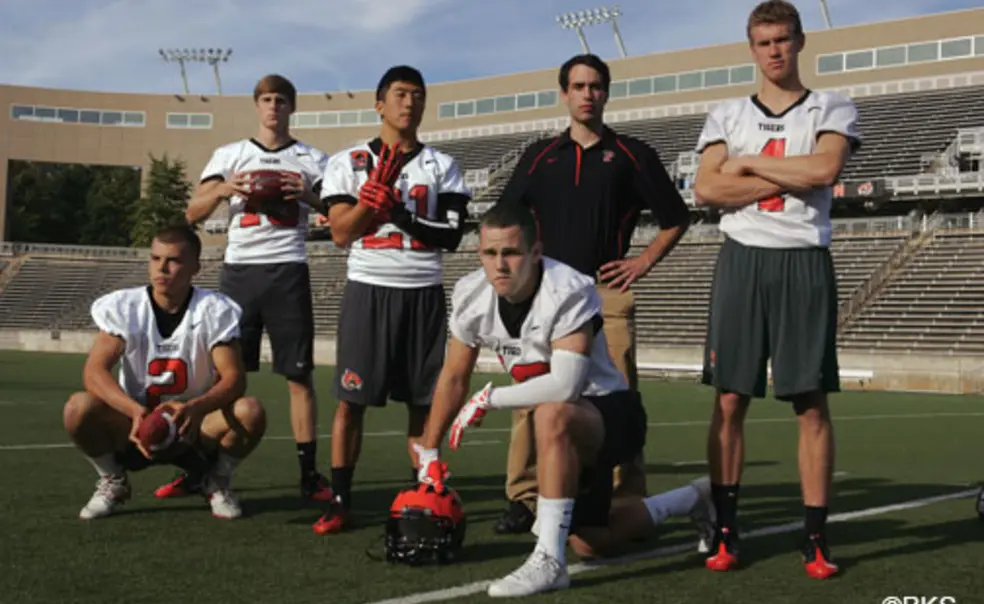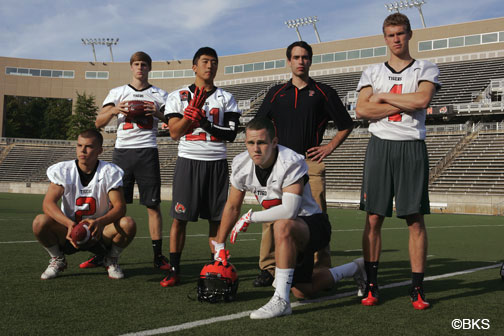Sprint Football: Undaunted in Defeat
After 13 years of losses in league games, the men of sprint football still play to win
The sprint football team holds an unenviable record — it last won a league game in 1999, when Harold Shapiro *64 was Princeton’s president. Some losses have been categorical sweeps — 98–0 against Navy, 70–0 against Penn. So it’s a wonder the team’s players show up undaunted, their commitment unwavering.
“Some people think that because we lose all the time, we must not care,” said Ben Foulon ’14, a former captain. “But we take it personally.”
Though it is played according to the same rules as traditional football, sprint displays more hustle than heft since players may not weigh more than 172 pounds. It is an official varsity sport at Princeton, though the team competes in the seven-school Collegiate Sprint Football League, not the Ivy League or the NCAA. The Tigers have captured nine championships since 1934, the last one in 1989, and had several competitive seasons until 1999 (Princeton did defeat Virginia Military Institute, a club team, in 2005). The team foundered after the University cut all slots for recruited players, athletic director Gary Walters ’67 told The Daily Princetonian.
Recruitment often is carried out by the players. John Wolfe ’14 scouts Dillon Gym for “anybody under 200 pounds with some semblance of athleticism.” He spotted Spencer Haldeman ’15 as a freshman bench-pressing 165 pounds. “Ever played football or heard of sprint?” Wolfe asked. No, Haldeman replied. But he agreed to attend a practice, and today, he doubles as a defensive end and an offensive lineman.
Most sprint players have proven themselves in athletics, but not in football. Kevin Ma ’14 battled opponents over a pingpong table, Adam Grabowski ’17 on a tennis court. Coach Stephen Everette begins practice in the classroom. “We call it Football 100,” he said, noting that he often helps rookies identify the line of scrimmage. Some guys have “never made a tackle in their life,” said Wolfe.
Though 13 years of defeats loom large, the squad refuses to buckle. Last season, the team lost by just one touchdown in three games, and was close to a victory over Post University.
“There’s no fame or glory in sprint,” Wolfe said. “These guys show up for the right reason, for the only reason: to play football.”













1 Response
Jeffrey Georgia ’78
10 Years AgoGary Walters’ Legacy
Thanks for your piece (however brief) on sprint football, one of the few teams left that really can be shown to be playing completely for the love of the game (On the Campus, Oct. 9). I was surprised you alluded to the elephant in the room as summed up by our athletic director: “The team foundered after the University cut all slots for recruited players,” and yet failed to follow this stunner with even a little more in-depth analysis. Who do we think made the decision to cut the slots, if not Gary Walters as the A.D.? Why was this decision made?
You could have reported how P.J. Chew ’95, the longtime president of our alumni group (responsible for raising tens of thousands of dollars), was asked to resign by Mr. Walters for embarrassing him over the University’s chronic lack of support. Of all the varsity programs at Princeton, why has sprint football been singled out for removal of a few preferred slots in the admission process? Because it isn’t a big moneymaker? It isn’t nationally famous?
You might find it interesting to dig deeper into how the University’s policies toward this small but courageous group have resulted in the most impressive losing streak since records began. Perhaps once Mr. Walters has retired, we can start recruiting and playing some folks who played football for 10 years in places like Landon, St. Albans, and other small schools still cranking out bright, experienced (if body-mass-challenged) men who would like to be counted among the ranks of winning Tigers.